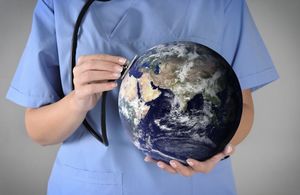Government progresses ban on LGBT Conversion Therapy
- Government launches consultation on how to make coercive conversion therapies illegal
- Proposed new laws will protect LGBT people, and especially under 18s, ensuring individuals cannot promote or profit from this harmful practice
- Government to fund support for victims of conversion therapy, including helpline
In May this year, Truss announced her intention to introduce a legislative ban on the practice of conversion therapy, which seeks to change people’s sexual orientation or gender identity.
The 6-week government consultation on how to legislate for such a ban, launched today, is the next step in that process. Throughout the summer further engagement was carried out with victims of conversion therapy, many of whom detailed the negative impacts on their mental health, and key stakeholders.
The government’s proposals to ban conversion therapy in England and Wales include:
- Ensuring physical conversion therapy acts are sentenced appropriately and introducing a new offence for so-called talking conversion therapies
- Ensuring those found guilty of conversion therapy offences have any profit they obtained from those crimes removed, and strengthening the case for individuals to be disqualified from holding a senior role in a charity where they are convicted of a conversion therapy offence
- Introducing Conversion Therapy Protection Orders to protect potential victims from undergoing the practice, including abroad – this could include removing passports of potential victims, who are at risk of being taken overseas for conversion therapy
- Exploring further measures to prevent the promotion of conversion therapy
The consultation will allow individuals to express their views on these proposals, presenting a vital opportunity for the public and key stakeholders to work with the government to develop an effective ban.
Once the consultation has closed, the responses will inform further refinements to the proposals. The government will prepare and introduce legislation by spring 2022.
Minister for Women and Equalities, Liz Truss, said:
“There should be no place for the abhorrent practice of coercive conversion therapy in our society.
“Today we are publishing detailed proposals that will stop appalling conversion therapies and make sure LGBT people can live their lives free from the threat of harm or abuse.
“As we build back better from the pandemic, I want everyone to be able to love who they want and be themselves. Today’s announcement sets out how we will ban an archaic practice that has no place in modern life.”
Growing international evidence suggests that there is a strong link between conversion therapy and serious psychological harm. The government will make funding available to support victims of conversion therapy practices, making sure that those who need help can access it. In November, a competitive tendering process for a new government-funded support service for victims and those at risk of conversion therapy will be launched.
Minister for Equalities, Mike Freer, said:
“Everybody should be safe to be themselves at home, in the workplace and going about their daily lives. That is why we have set out these proposals to ban coercive conversion therapy and stop it impacting on the lives of people in this country.
“Input from victims and stakeholder groups will be vital and I urge everyone to have their say, making sure the ban puts an end to these practices, once and for all.”
Whilst violent forms of conversion therapy are already covered under other offences, the proposals that have been presented today would make all coercive conversion therapies illegal, making sure that where conversion therapy is the motive for violence, judges consider it as a potential aggravating factor when sentencing.
The government is also keen to safeguard under 18s, who are often targeted at a young age due to their vulnerability. Future laws will therefore place a particularly strong emphasis on preventing children undergoing any practices considered to be conversion therapies.
The proposals will also ensure that regulated clinicians are protected and are able to continue to undertake their valuable work. The ban will not seek to restrain these medical professionals and individuals should be free to seek out professional help and guidance, it will however target practices which people have not willingly agreed to undertake.
Alongside the proposed legislation for a specific ban, the Equality Hub will work across government to explore ways to prevent the promotion of conversion therapies in this country. This includes working with DCMS and others to consider vehicles to prevent online promotion.
Further Information:
- The government would like to hear from everyone with an opinion on how we should introduce the ban and urge those with an interest and particularly those with experience of conversion therapy to come forward.
- The government committed to banning conversion therapy in the Queen’s Speech.
- A Conversion Therapy Protection Order will set out certain conditions to protect a person from undergoing the practice, including removing a passport for those under risk of being taken abroad or any requirement that the court considers necessary to protect the person for whose protection the order is made.
- The government will work closely with devolved administrations in order to protect people from conversion therapy across the UK
- The consultation will run for six weeks, closing on 10 December.
- Alongside the consultation a research report on the impact of conversion therapy, completed by Coventry University, will be published.
